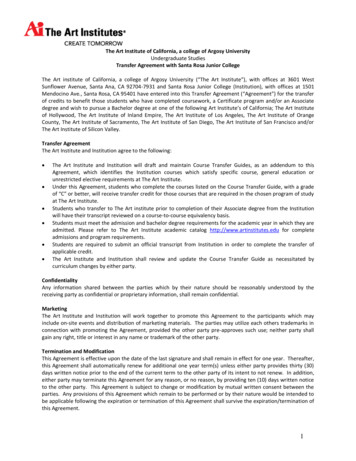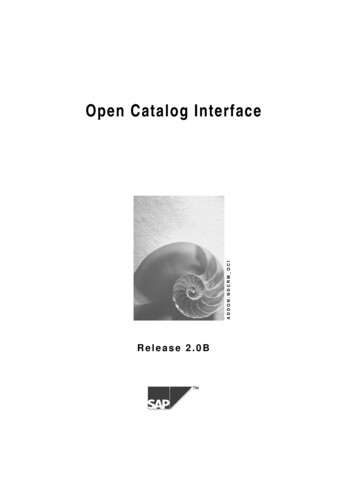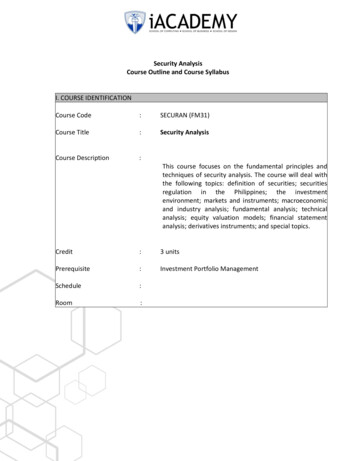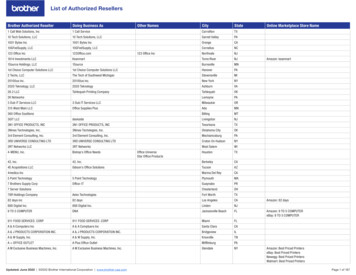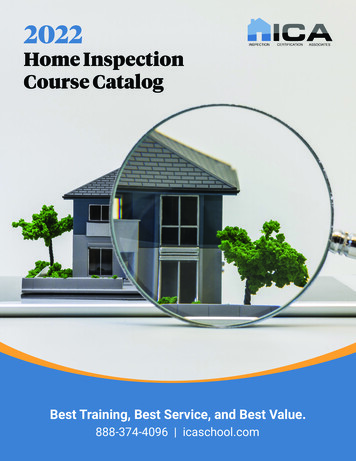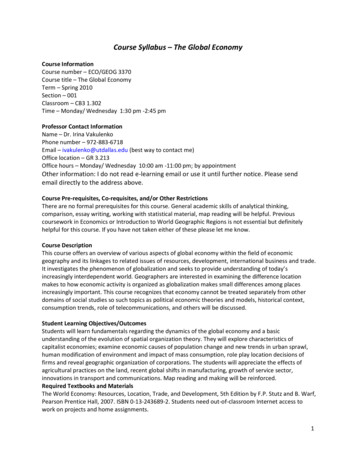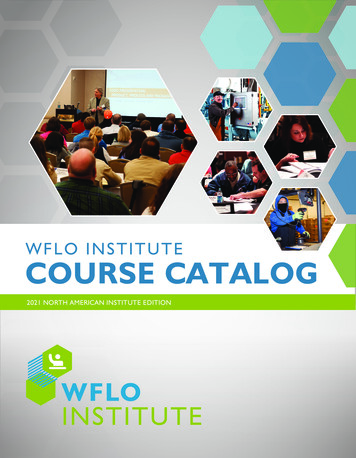
Transcription
WFLO INSTITUTECOURSE CATALOG2021 NORTH AMERICAN INSTITUTE EDITION
TABLE OF CONTENTSYEAR ONE COURSES . 1Accessing Your Resources . 1Ammonia Safety . 1Business Writing . 1Customer Conflict Resolution . 1Customer Service Essentials. 2Emergency Response Planning . 2Emotional Intelligence . 2Food Safety: HACCP and FSMA . 2Forklift Safety . 3Fundamentals of Food Storage and Preservation . 3Job Safety Analysis . 3Leadership Development . 3Risk Management: Warehouse Exposures . 4Supply Chain Basics . 4Transportation and Warehousing . 4Warehouse Operation Essentials . 4YEAR TWO COURSES . 5Budgeting and Financial Controls . 5Business Planning and Financial Decision-Making . 5Behavioral Interviewing . 5Customer Recall Simulation . 5Effective Presentations . 6Employee Training For Safety . 6Feedback and Coaching . 6GFSI - Food Safety . 6International Business and the Cold Chain . 6Introduction to Warehouse Law . 7Managing and Motivating Human Performance . 7i
Refrigeration and Energy . 7Sanitation Auditing . 7YEAR THREE COURSES . 8Analyzing Refrigeration Systems . 8Best Practices For Food Tempering, Chilling, and Freezing . 8Business Development . 8Case Studies in Warehouse Law . 8Change Management . 9Crisis Management . 9Employment Practices and Liabilities . 9Preparing For Inspections . 9Regulations and Your Job . 9Transfer of Knowledge to the Workplace . 10Trends and Technologies in Warehouse Management . 10Warehouse Security . 10TRANSPORTATION TRACK COURSES .11Accessing Your Resources . 11Business Planning and Financial Decision-Making . 11Business Writing . 11Carrier Relationships . 11Customer Service Essentials . 12Effective Presentations . 12Emotional Intelligence . 12Food Safety: HACCP and FSMA . 12Leadership Development . 13Risk Management: Transportation Exposures . 13Supply Chain Basics. 13Transportation and Warehousing. 13Transportation Basics I and II . 14Transportation Safety . 14ii
YEAR ONE COURSESACCESSING YOUR RESOURCESUpon completion of this course, students will: Identify GCCA and WFLO programs and services.Match GCCA member benefits such as technical guides to industry-specific use cases.Use the GCCA website to access the online community, inquiry service and Scientific Advisory Council.AMMONIA SAFETYUpon completion of this course, students will: Describe the health effects of ammonia exposure.List the initial first aid protocols for ammonia exposure.Define the physical and chemical characteristics of ammonia that affect safety and its use as a refrigerant.BUSINESS WRITINGUpon completion of this course, students will: Analyze their writing skills to find areas that need improvement.Identify the benefits of professional writing style.Compose an employee performance review with all the necessary content.CUSTOMER CONFLICT RESOLUTIONUpon completion of this course, students will: Identify the eleven difficult customer types.Describe ten ways to handle disagreements effectively.Create a plan to engage with customers on a regular basis.1
CUSTOMER SERVICE ESSENTIALSUpon completion of this course, students will: Explain the importance of delivering excellent customer service to the maintenance and growth of yourcompany's customer base.Analyze potential solutions to customer complaints.Resolve customer complaints to restore customer satisfaction.EMERGENCY RESPONSE PLANNINGUpon completion of this course, students will: Define "Emergency Action Plan" and "Emergency Response Plan."Identify the key components of each plan.Match the appropriate level of training for each warehouse employee role.Compare the advantages and disadvantages of using in-house or outside emergency response services.EMOTIONAL INTELLIGENCEUpon completion of this course, students will: Explain the impact of emotional intelligence (EQ) on effective leadership.Apply the four domains of EQ to their lives and their leadership.Create a plan to develop their EQ with regard to their role at their company and facility.FOOD SAFETY: HACCP AND FSMAUpon completion of this course, students will: Comprehend the implications of food regulations on their job.Distinguish food quality from food safety.Identify food safety requirements for the public refrigerated warehouse industry.2
FORKLIFT SAFETYUpon completion of this course, students will: Identify the minimum requirements for an effective lift truck safety training program.Compare options for delivering forklift training.Evaluate the effectiveness of the forklift safety program in their facility.FUNDAMENTALS OF FOOD STORAGE AND PRESERVATIONUpon completion of this course, students will: Describe the effect of freezing and frozen storage on the quality of food products.Identify the factors that influence shelf-life.Recognize the effect of temperature on chemical reaction rates.Use the WFLO Commodity Storage Manual to access commodity-specific requirements.JOB SAFETY ANALYSISUpon completion of this course, students will: Describe the role OSHA plays in third-party logistics operations.Explain the importance of Job Safety Analyses (JSAs).Describe the five-step Job Safety Analysis procedure.Conduct a Job Safety Analysis.LEADERSHIP DEVELOPMENTUpon completion of this course, students will: Differentiate various leadership styles.Use personalized strategies to drive commitment and initiative.Adapt their personal style to yield collaborative, interdependent, and supportive teams.3
RISK MANAGEMENT: WAREHOUSE EXPOSURESUpon completion of this course, students will: Identify the basic exposures of loss to a public refrigerated warehouse.Analyze various loss prevention techniques currently in use by warehouse operators.SUPPLY CHAIN BASICSUpon completion of this course, students will: Define the term “cold chain.”Explain the role that you and your company play in temperature-controlled logistics.Summarize the cold chain industry's role in the domestic and international food markets.TRANSPORTATION AND WAREHOUSINGUpon completion of this course, students will: Identify ways public refrigerated warehouses are becoming involved in the transportation function.Recognize opportunities for the warehouse to assist carriers.Predict the effect of the latest trends on transportation companies, shippers, and receivers.WAREHOUSE OPERATION ESSENTIALSUpon completion of this course, students will: Describe the ways the public refrigerated warehouse industry is changing.Compare procedures in your warehouse to those used in other facilities.Outline the steps involved in handling controlled-temperature products.4
YEAR TWO COURSESBUDGETING AND FINANCIAL CONTROLSUpon completion of this course, students will: Explain the budgeting process.Recognize the components and interaction of a Balance Sheet and Profit and Loss Statement.Calculate cash flow for a given period.Apply a cost-benefit analysis technique for securing the approval of a project.BUSINESS PLANNING AND FINANCIAL DECISION-MAKINGUpon completion of this course, students will: Recognize opportunities to control expenses and increase profits within their operation.Utilize a cost-benefit analysis.Create a business plan to justify capital expenditures.BEHAVIORAL INTERVIEWINGUpon completion of this course, students will: List the steps for preparing to interview a job candidate.Construct a series of behavioral questions that align to a job description.Evaluate candidate responses to determine the best fit for a given position.CUSTOMER RECALL SIMULATIONUpon completion of this course, students will: Describe the process of a recall.Identify the 3PL warehouse’s responsibilities during a recall.Conduct an effective mock recall.5
EFFECTIVE PRESENTATIONSUpon completion of this course, students will: Define appropriate scenarios when a presentation is necessary.Identify how to structure a clear presentation.Use visual aids effectively.List tips for making a powerful first impression.EMPLOYEE TRAINING FOR SAFETYUpon completion of this course, students will: Define your role as a safety leader.Apply strategies for providing and reinforcing safety feedback.Identify techniques for value-added safety training.FEEDBACK AND COACHINGUpon completion of this course, students will: Define what effective coaching looks like in a workplace/management environment.Differentiate the importance of positive feedback from feedback for growth.Apply techniques for delivering employee-specific feedback.GFSI - FOOD SAFETYUpon completion of this course, students will: Define the Global Food Safety Initiative and related schemes such as BRC and SQF.Identify consideration factors for GFSI implementation.INTERNATIONAL BUSINESS AND THE COLD CHAINUpon completion of this course, students will: Explain the structure of the international cold chain.Define common maritime industry nomenclature.Analyze the impact of government agencies on international business.6
INTRODUCTION TO WAREHOUSE LAWUpon completion of this course, students will: Interpret the "reasonable care" standard.Differentiate between negotiable and non-negotiable warehouse receipts.Identify strategies to maximize the enforcement of terms and conditions.MANAGING AND MOTIVATING HUMAN PERFORMANCEUpon completion of this course, students will: Relate employee performance to personal and operational success.Identify best practices for annual goal setting.Summarize frameworks for measuring and evaluating employee performance.REFRIGERATION AND ENERGYUpon completion of this course, students will: Define energy demand.List the systems and employee roles that have the greatest influence on energy use in your facility.Describe the components of an energy management strategy.Analyze their warehouse facility energy management program.SANITATION AUDITINGUpon completion of this course, students will: Defend the reasons for conducting a sanitation audit.Recognize critical conditions that would prevent an “excellent” audit grade.Analyze their warehouse’s sanitation procedures for weaknesses.7
YEAR THREE COURSESANALYZING REFRIGERATION SYSTEMSUpon completion of this course, students will: List the core components of a refrigeration system.Match system components with facility specifications for maximum efficiency.Use favorable electrical rates to control operating costs.Evaluate low-cost facility modifications that will have the greatest impact on energy use.BEST PRACTICES FOR FOOD TEMPERING, CHILLING AND FREEZINGUpon completion of this course, students will: Match different commodities to their appropriate temperature ranges for storage.Define processes for changing temperature zones.Use the Cost and Time to Freeze Calculator to calculate the most efficient storage conditions.BUSINESS DEVELOPMENTUpon completion of this course, students will: Summarize an integrated approach to business development.Define the customer's priorities when doing business with a third-party logistics provider.List practical strategies for protecting and improving sales margins.Construct business agreements that are mutually agreeable to all parties.CASE STUDIES IN WAREHOUSE LAWUpon completion of this course, students will: Distinguish between specific and general lines.Explain the pitfalls of customer-prepared agreements.Given a case study, predict potential legal issues and suggest actions to reduce the liability of awarehouse.8
CHANGE MANAGEMENTUpon completion of this course, students will: Recognize the effects of change on employees, customers, and other stakeholders.Identify healthy responses to change.Describe the forces causing organizational change and the implications for the organization.CRISIS MANAGEMENTUpon completion of this course, students will: Identify proper protocols for responding to fires, ammonia leaks, natural disasters and other emergencies.Evaluate existing plans to protect employee safety.EMPLOYMENT PRACTICES AND LIABILITIESUpon completion of this course, students will: Identify two areas in the Employment Life Cycle that expose a company to discrimination claims.Distinguish behaviors that could be considered sexual harassment.Recommend strategies to minimize risk exposure.PREPARING FOR INSPECTIONSUpon completion of this course, students will: Outline the expectations of the inspector upon arrival.List actions that can be taken to assist the inspector.Prepare a facility for inspection by implementing daily protocols.REGULATIONS AND YOUR JOBUpon completion of this course, students will: Identify regulatory agencies that most impact cold storage companies.Paraphrase the process by which regulations are enacted.Select strategies for implementing regulatory compliance.9
TRANSFER OF KNOWLEDGE TO THE WORKPLACEUpon completion of this course, students will: Analyze the knowledge and skills attained throughout their Institute experience.Identify dynamics that prevent learners from applying new knowledge.Apply their Institute learning to their job accountabilities.TRENDS AND TECHNOLOGIES IN WAREHOUSE MANAGEMENTUpon completion of this course, students will: Identify current and emerging technological trends in cold storage operations.Compare costs and operational savings of new technologies to conventional equipment and processes.Given a specific use case, select cost-effective technologies that improve productivity and efficiency.WAREHOUSE SECURITYUpon completion of this course, students will: List security threats facing public refrigerated warehouses.Identify strategies to minimize security risks and damage.Devise a documentation procedure to satisfy customers and regulatory requirements.10
TRANSPORTATION TRACK COURSES(Please note that the Transportation Track is only offered at WFLO Institute West)ACCESSING YOUR RESOURCESUpon completion of this course, students will: Identify GCCA and WFLO programs and services.Match GCCA member benefits such as technical guides to industry-specific use cases.Use the GCCA website to access the online community, inquiry service and Scientific Advisory Council.BUSINESS PLANNING AND FINANCIAL DECISION-MAKINGUpon completion of this course, students will: Recognize opportunities to control expenses and increase profits within their operation.Utilize a cost-benefit analysis.Create a business plan to justify capital expenditures.BUSINESS WRITINGUpon completion of this course, students will: Analyze their writing skills to find areas that need improvement.Identify the benefits of professional writing style.Compose an employee performance review with all the necessary content.CARRIER RELATIONSHIPSUpon completion of this course, students will: Define the carrier's priorities when doing business with a warehouse customer/partner.Modify their business operations attract new carrier partnerships.Outline clear expectations for partnering with trucking companies.Resolve common conflicts with between warehouse and carrier partners.11
CUSTOMER SERVICE ESSENTIALSUpon completion of this course, students will: Explain the importance of delivering excellent customer service to the maintenance and growth of yourcompany's customer base.Analyze potential solutions to customer complaints.Resolve customer complaints to restore customer satisfaction.EFFECTIVE PRESENTATIONSUpon completion of this course, students will: Define appropriate scenarios when a presentation is necessary.Identify how to structure a clear presentation.Use visual aids effectively.List tips for making a powerful first impression.EMOTIONAL INTELLIGENCEUpon completion of this course, students will: Explain the impact of emotional intelligence (EQ) on effective leadership.Apply the four domains of EQ to their lives and their leadership.Create a plan to develop their EQ with regard to their role at their company and facility.FOOD SAFETY: HACCP AND FSMAUpon completion of this course, students will: Comprehend the implications of food regulations on their job.Distinguish food quality from food safety.Identify food safety requirements for the public refrigerated warehouse industry.12
LEADERSHIP DEVELOPMENTUpon completion of this course, students will: Differentiate various leadership styles.Use personalized strategies to drive commitment and initiative.Adapt their personal style to yield collaborative, interdependent, and supportive teams.RISK MANAGEMENT: TRANSPORTATION EXPOSURESUpon completion of this course, students will: Identify the responsiblities and liabilities of the broker, carrier, and shipper.Describe the process for filing claims.Interpret the FMCSA safety ratings.Outline mandatory insurance requirements.SUPPLY CHAIN BASICSUpon completion of this course, students will: Define the term “cold chain.”Explain the role that you and your company play in temperature-controlled logistics.Summarize the cold chain industry's role in the domestic and international food markets.TRANSPORTATION AND WAREHOUSINGUpon completion of this course, students will: Identify ways public refrigerated warehouses are becoming involved in the transportation function.Recognize opportunities for the warehouse to assist carriers.Predict the effect of the latest trends on transportation companies, shippers, and receivers.13
TRANSPORTATION BASICS I and IIUpon completion of this course, students will: Understand the role of temperature control in cold chain transportation.Identify transportation modes.Learn the basics of a reefer unit.Understand the basics and importance of pre-cooling a trailer.Differentiate between primary operational and business differences of asset vs. non-asset transportationcompanies.TRANSPORTATION SAFETYUpon completion of this course, students will: Learn best safety practices for drivers (ELDs, pre-trip and post-trip inspections, weather conditions, etc.)Understand what driver trainings are available, and what, if any, are mandatory,Identify new/important safety technologies, 4. Identify resources for more safety information.14
241 18th Street South, Suite 620, Arlington, VA 22202Phone 1 703 373 4300www.gcca.org
3 FORKLIFT SAFETY Upon completion of this course, students will: Identify the minimum requirements for an effective lift truck safety training program. Compare options for delivering forklift training. Evaluate the effectiveness of the forklift safety program in their facility. FUNDAMENTALS OF FOOD STORAGE AND PRESERVATION Upon completion of this course, students will:
